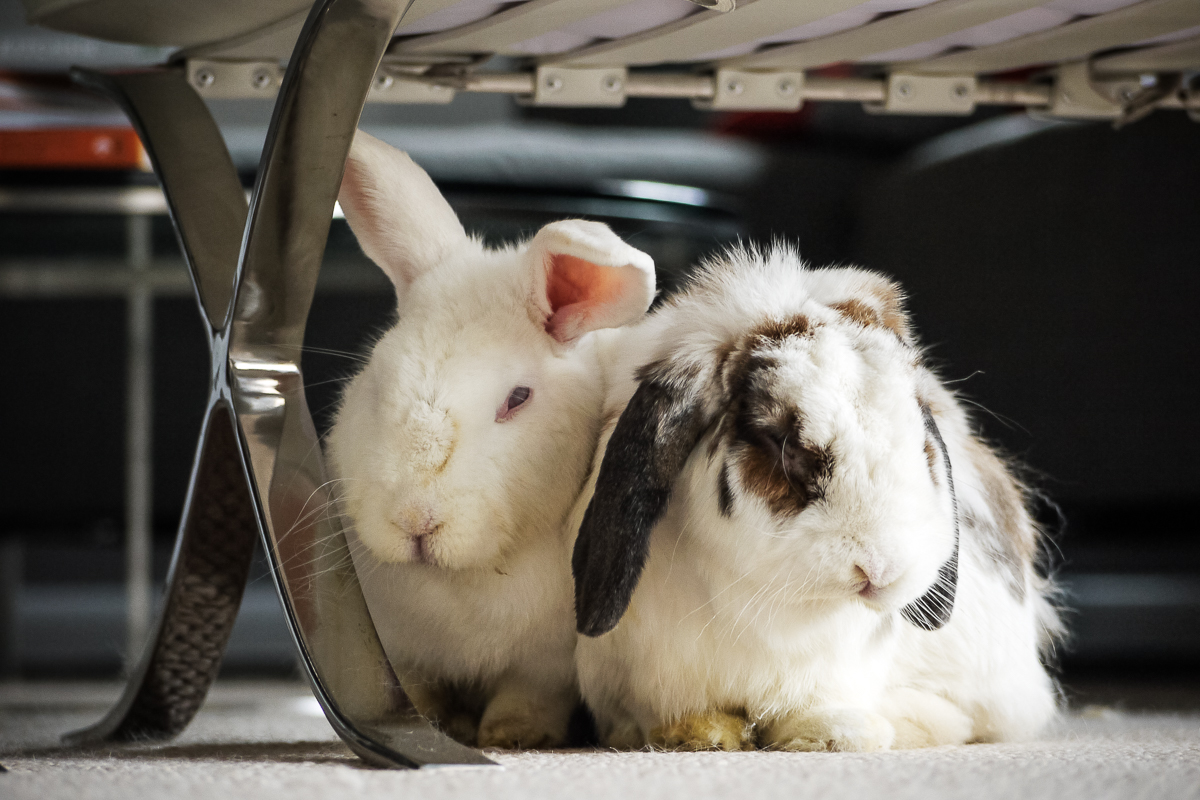
Common Rabbit Questions
Yes, rabbits can make wonderful pets for the right individuals or families. They are intelligent, social animals that can form strong bonds with their caretakers. Check out our Rabbit Care Primer to find out more about basic rabbit care.
While rabbits can be relatively easy to care for with the right knowledge and commitment, it's essential to do thorough research before bringing a rabbit into your home. Understanding their specific needs and dedicating time to their care and social interaction can contribute to a positive and fulfilling experience for both the owner and the rabbit.
Caring for rabbits requires attention to specific needs:
- Provide safe, spacious housing.
- Offer a balanced diet of hay, vegetables, and pellets.
- Ensure social interaction; rabbits thrive with companionship.
- Regular veterinary care, including spaying/neutering, is essential.
- Litter training requires patience and consistency.
- Some breeds need regular grooming to prevent matting.
- Rabbit-proof your home to address chewing instincts.
Combining rabbits and young children in the same household can be callenging, primarily due to the natural behaviors and needs of both. Rabbits are delicate creatures that require gentle handling and a calm environment, while young children, in their exuberance and curiosity, might not always understand the subtleties of rabbit care and behavior.
Rabbits can live for 10-12 years if they are spayed/neutered, live indoors, have proper housing, and medical care.
A rabbit's diet should consist of mostly hay, some leafy greens, and a few quality pellets.
Rabbits thrive living indoors in large pens and free roaming. More on habitats and space here.
Rabbits are affectionate, but most rabbits naturally prefer to keep their feet on the ground and may not enjoy being picked up, cuddled, or held. This preference stems from their instincts as prey animals; in the wild, being lifted off the ground typically signals danger, such as being caught by a predator. Consequently, even domestic rabbits often retain this instinctual fear.
Rabbits should not be bathed regularly. Like cats, they are quite fastidious and keep themselves clean. Occasionally they might need a "butt bath."
Rabbits need to visit the vet at least yearly for a wellness check and RHDv2 vaccine.
Caretakers may assume there's no need to visit the vet unless their rabbit shows signs of illness. However, this line of thinking overlooks the fact that rabbits often conceal their weaknesses.
We can help you find a rabbit-savvy vet near you and figure out if the vet is right for your bunny.
If you are lucky enough to find a rabbit-savvy vet, the next frustration will likely be the cost. Veterinary care for rabbits, categorized under “exotics,” can be quite expensive.
Yes! Rabbits should be spayed/neutered for heath reasons, behavioral reasons, and to allow them to have a companion.
For first-time rabbit owners, it's essential to have the right supplies to create a safe and comfortable environment for your new pet. Here's a basic house rabbit supply list:
- Housing:
- Indoor pen or enclosure with ample space for movement.
- A hideaway or bunny condo for privacy.
- Litter and Litter Box:
- Rabbit-safe litter (pellets or recycled paper).
- Litter box with low sides for easy access.
- Bedding:
- Food and Water:
- High-quality rabbit pellets.
- Fresh vegetables , especially leafy greens.
- Freshwater in a heavy, spill-proof bowl or a rabbit-safe water bottle.
- Feeding Dish:
- Heavy, ceramic feeding dish for pellets and vegetables.
- Toys and Enrichment:
- Chew toys (wooden blocks, apple sticks) to satisfy their natural chewing instincts.
- Toys for mental stimulation (tunnels, balls).
- Grooming Supplies:
- Rabbit brush for grooming, especially for long-haired breeds.
- Nail clippers for regular nail maintenance.
- Healthcare:
- First aid kit with styptic powder for nail trimming accidents.
- Contact information for a rabbit-savvy veterinarian.
- Rabbit-Proofing Supplies:
- Electrical cord protectors to prevent chewing.
- Baby gates or barriers to limit access to certain areas.
- Cleaning Supplies:
- Pet-friendly cleaning products.
- Small broom and dustpan for daily cleaning.